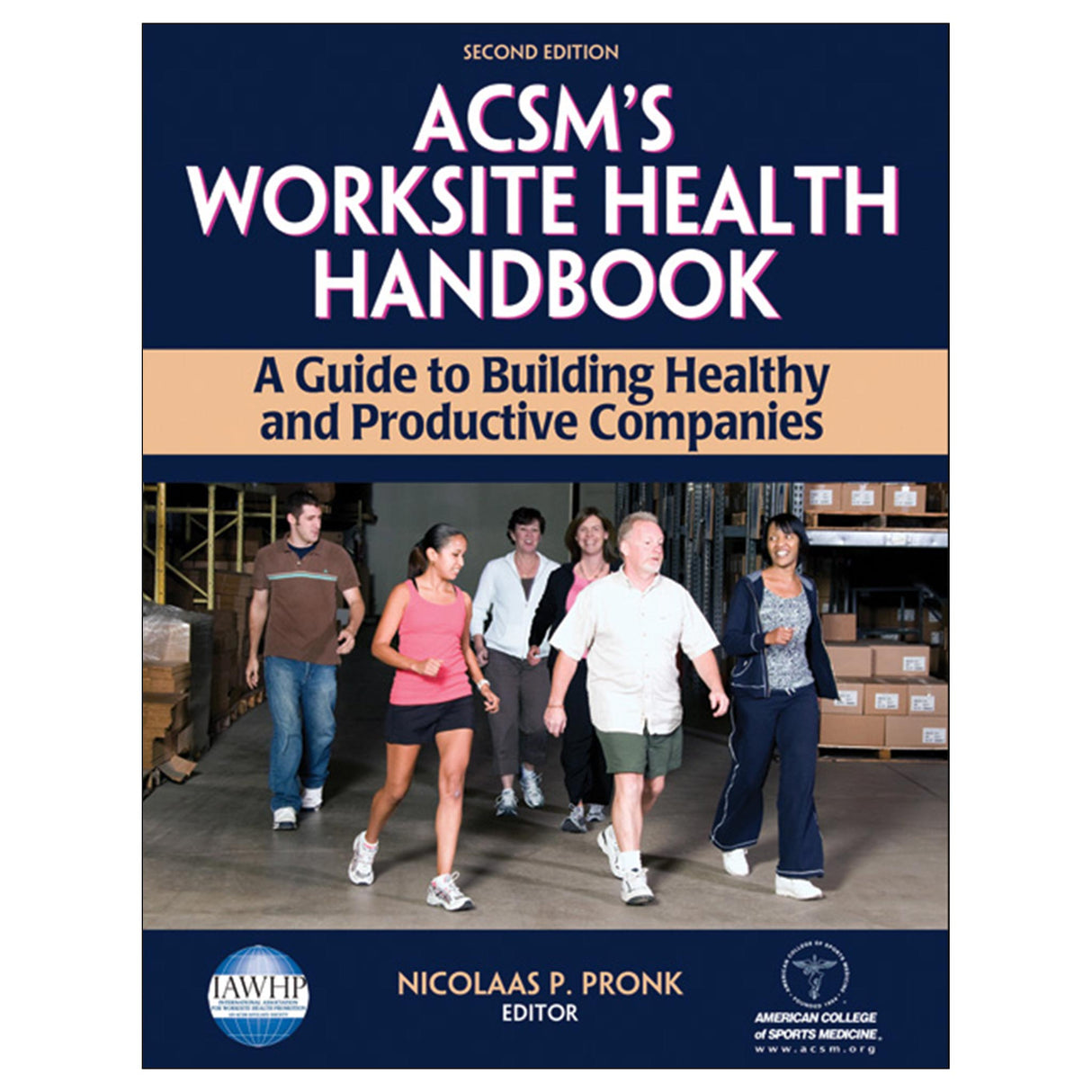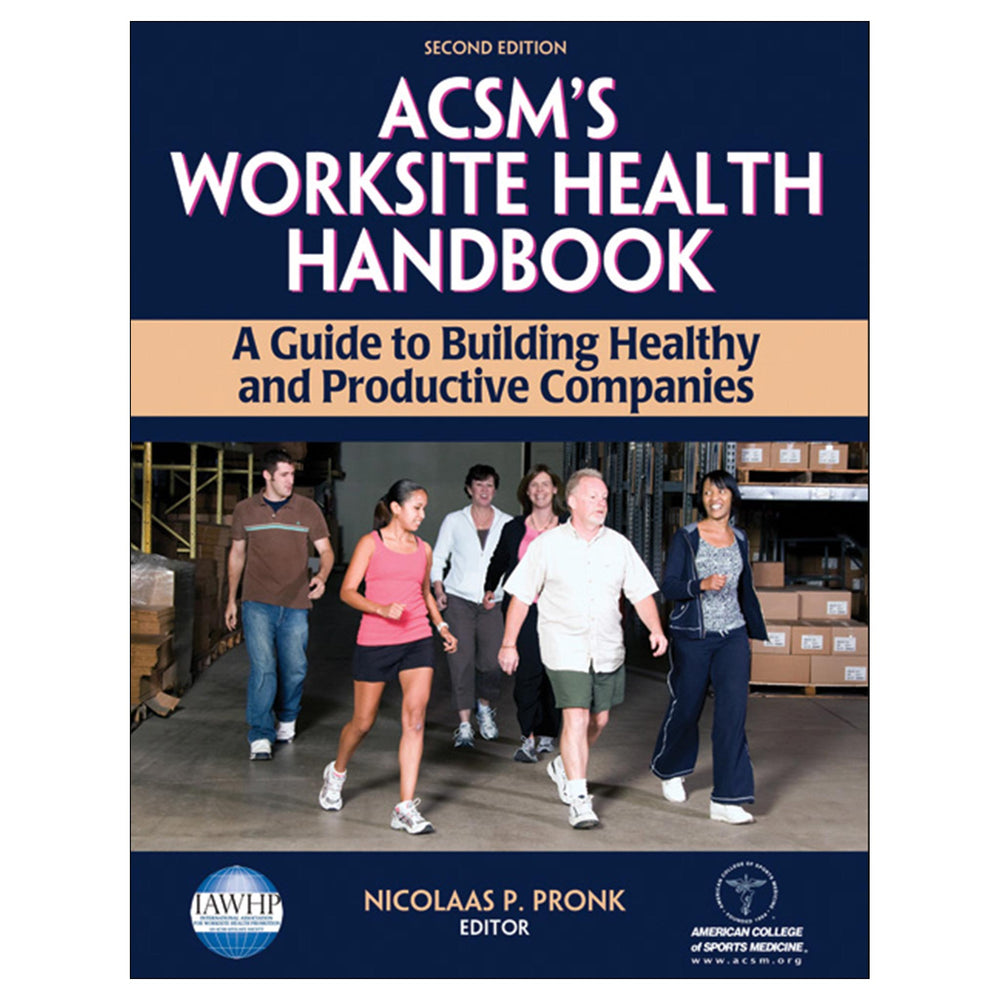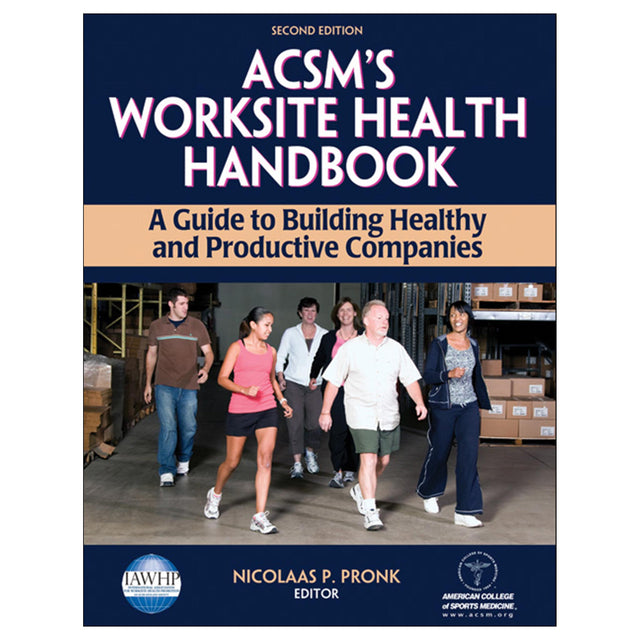ACSM's Worksite Health Handbook - 2nd Edition
A Guide to Building Healthy and Productive Companies
$72.00 USD
Encouraging and maintaining a healthy workforce have become key components in the challege to reduce health care expenditures and health-related productivity losses. As companies more fully realize the impact of healthy workers on the financial health of their organization, health promotion professionals seek support to design and implement interventions that generate improvements in workers' health and business performance.
The second edition of ACSM's Worksite Health Handbook: A Guide to Building Healthy and Productive Companies connects worksite health research and practice to offer health promotion professionals the information, ideas, and approaches to provide affordable, scalable, and sustainable solutions for the organizations they serve.
Thoroughly updated with the latest research and expanded to better support the business case for worksite programs, the second edition of ACSM's Worksite Health Handbook includes the contributions of nearly 100 of the top researchers and practitioners in the field from Canada, Europe, and the United States. The book's mix of research, evidence, and practice makes it a definitive and comprehensive resource on worksite health promotion, productivity management, disease prevention, and chronic disease management.
ACSM's Worksite Health Handbook, Second Edition, has the following features:
-An overview of contextual issues, including a history of the field, the current state of the field, legal perspectives, and the role of health policy in worksite programs
-A review of the effectiveness of strategies in worksite settings, including economic impact, best practices, and the health–productivity relationship
-Information on assessment, measurement, and evaluation, including health and productivity assessment tools, the economic returns of health improvement programs, and appropriate use of claims-based analysis and planning
-A thorough discussion of program design and implementation, including the application of behavior change theory, new ways of using data to engage participants, use of technology and social networks to improve effectiveness, and key features of best-practice programs
-An examination of various strategies for encouraging employee involvement, such as incorporating online communities and e-health, providing incentives, using medical self-care programs, making changes to the built environment, and tying in wellness with health and safety
The book includes a chapter that covers the implementation process step by step so that you can see how all of the components fit together in the creation of a complete program. You'll also find four in-depth case studies that offer innovative perspectives on implementing programs in a variety of work settings. Each case study includes a profile of the company, a description of the program and the program goals, information on the population being served, the results of the program, and a summary or discussion of the program. Throughout the book you'll find practical ideas, approaches, and solutions for implementation as well as examples of best practices and successful programs that will support your efforts in creating interventions that improve both workers' health and business performance.
The book is endorsed by the International Association for Worksite Health Promotion, a new ACSM affiliate society.
Deepen your understanding of the key issues and challenges within worksite health promotion and find the most current research and practice-based information and approaches inside ACSM's Worksite Health Handbook: A Guide to Building Healthy and Productive Companies, Second Edition.
Audience
Professional reference for worksite health promotion professionals, supplemental text for upper-undergraduate and beginning graduate students in health promotion programs.
Part I: Setting the Context
Chapter 1: Population Health Management at the Worksite
Nicolaas P. Pronk, PhD, FACSM
Chapter 2: Employee Health Promotion: A Historical Perspective
R. William Whitmer, MBA
Chapter 3: Workplace-Based Health and Wellness Services
Raymond Fabius, MD, CPE, and Sharon Glave Frazee, PhD
Chapter 4: State of the Worksite Health Promotion Industry: The 2004 National Worksite Health Promotion Survey
Laura A. Linnan, ScD, CHES
Chapter 5: Health Promotion Programming in Small, Medium, and Large Businesses
Heather M. Bowen, MS, RD, LD; Todd D. Smith, MS, CSP, ARM; Mark G. Wilson, HSD; and David M. Dejoy, PhD
Chapter 6: Employee Health Promotion: A Legal Perspective
Alison Cline Earles, Esq, and Luann Heinen, MPP
Chapter 7: Health Care Policy and Health Promotion
John M. Clymer, AB; Garry Lindsay, MPH, CHES; Jennifer Childress, MS, CHES; and George J. Pfeiffer MSE
Chapter 8: The Case for Change: From Segregated to Integrated Employee Health Management
Ann Yaktine, PhD, and Mike Parkinson, MD, MPH
Part II: The Evidence for Employer-Sponsored Health Programs
Chapter 9: An Introduction to Evidence on Worksite Health Promotion
Jonathan E. Fielding, MD, MPH, MBA, and David P. Hopkins, MD, MPH
Chapter 10: The Assessment of Health Risks With Feedback: Results of a Systematic Review
Robin E. Soler, PhD; Matt Griffith, MPH; David P. Hopkins, MD, MPH; and Kimberly Leeks, PhD, MPH
Chapter 11: Practice and Research Connected: A Synergistic Process of Translation Through Knowledge Transfer
Nicolaas P. Pronk, PhD, FACSM
Chapter 12: Benchmarking and Best Practices in Worksite Health Promotion
Jessica Grossmeier, MPH; Lavaughn Palma-Davis, MA; K. Andrew Crighton, MD, CPE; Margaret Sabin, MHSA; and David R. Anderson, PhD
Chapter 13: Health and the Organization of Work
David Gimeno, PhD, and Benjamin C. Amick III, PhD
Chapter 14: Health and Productivity Management: An Overview
Joseph A. Leutzinger, PhD
Part III: Assessing Worker and Organizational Health
Chapter 15: Practical Program Evaluation: Ensuring Findings Are Used for Program Improvement
Thomas J. Chapel, MA, MBA, and Jason Lang, MPH, MS
Chapter 16: The Assessment of Health and Risk: Tools, Specific Uses, and Implementation Processes
Edward M. Framer, PhD, and Yosuke Chikamoto, PhD
Chapter 17: Organizational Assessment for Health
Thomas Golaszewski, EdD
Chapter 18: Assessment Tools for Employee Productivity
Nicolaas P. Pronk, PhD, FACSM
Chapter 19: Calculating the Economic Return of Health and Productivity Management Programs
Seth Serxner, PhD, MPH, and Daniel Gold, PhD
Chapter 20: Using Claims Analysis to Support Intervention Planning, Design, and Measurement
David H. Chenoweth, PhD, and Jeff A. Hochberg, MS
Part IV: Program Design and Implementation
Chapter 21: Organizing Intelligence to Achieve Increased Consumer Engagement, Behavior Change, and Health Improvement
Stephanie Pronk, MEd
Chapter 22: The Application of Behavior Change Theory in the Worksite Setting
Karen Glanz, PhD, MPH
Chapter 23: Keeping Healthy Workers Healthy: Creating a Culture of Health
Shirley Musich, PhD; Howard Schubiner, MD; and Timothy Mcdonald, MSHA
Chapter 24: Connecting the Program to Core Business Objectives
Steven P. Noeldner, PhD
Chapter 25: Addressing Diversity and Health Literacy at the Worksite
Antronette K. (Toni) Yancey, MD, MPH; A. Janet Tomiyama, MA; and Nicole Keith, PhD
Chapter 26: A Culture of Health: Creating and Sustaining Supportive Organizational Environments for Health
Nicolaas P. Pronk, PhD, FACSM, and Calvin U. Allen, MBA, CHIE
Chapter 27: Online Communities and Worksite Health Management
Neal Sofian, MSPH, and Daniel Newton, PhD
Chapter 28: Rewarding Change: Principles for Implementing Worksite Incentive Programs
Jeffrey J. VanWormer, MS, and Nicolaas P. Pronk, PhD, FACSM
Chapter 29: eHealth for Employee Health and Wellness: Optimizing Plan Design and Incentive Management
David K. Ahern, PhD; Lauren Buckel; Edward W. Aberger, PhD; and Michael J. Follick, PhD
Chapter 30: Effective Programs to Promote Worker Health Within Healthy and Safe Worksites
Glorian Sorensen, PhD, MPH, and Lisa Quintiliani, PhD
Chapter 31: Programs Designed to Improve Employee Health Through Changes in the Built Environment
Mireille N.M. van Poppel, PhD, and Luuk H. Engbers, PhD
Chapter 32: The Design, Implementation, and Evaluation of Medical Self-Care Programs
Don R. Powell, PhD, and Jeanette Karwan, RD
Chapter 33: Disease Management for Employed Populations
Dennis Richling, MD
Chapter 34: From the Basics to Comprehensive Programming
Mary Kruse, ATC
Part V: Case Studies
Chapter 35: The Occupational Athlete: Injury Reduction and Productivity Enhancement in Reforestation Workers
Delia Roberts, PhD, FACSM
Chapter 36: Employee Health at BAE Systems: An Employer–Health Plan Partnership Approach
N. Marcus Thygeson, MD; Jason Gallagher, MBA; Kathleen Cross, CANP; and Nicolaas P. Pronk, PhD, FACSM
Chapter 37: Health Promotion, Participation, and Productivity: A Case Study at Unilever PLC
Peter Mills, MD, and Jessica Colling, BSC, MSC
Chapter 38: Introducing Environmental Interventions at the Dow Chemical Company to Reduce Overweight and Obesity Among Workers
Ron Z. Goetzel, PhD; Jennie Bowen, MPH; Ronald J. Ozminkowski, PhD; Cheryl Kassed PhD, MSPH; Enid Chung Roemer, PhD; Maryam J. Tabrizi, MS, CHES; Meghan Short, BA; Shaohung Wang, PhD; Xiaofei Pei, PhD; Heather M. Bowen, MS, RD, LD; David M. Dejoy, PhD; Mark G. Wilson, HSD; Kristin M. Baker, MPH; Karen J. Tully, BS; John M. White, PhD; Gary M. Billotti, MS; and Catherine M. Baase, MD
“The second edition of this comprehensive handbook is a welcome addition to the field of worksite health promotion… [It] provides an excellent foundation to help guide health promotion professionals and students with an interest in worksite health promotion to craft interventions to improve workforce health and wellness; and to improve their understanding of the key issues involved in supporting and expanding worksite health and wellness programs. Highly recommended.”
CHOICE (Current Reviews for Academic Libraries)





